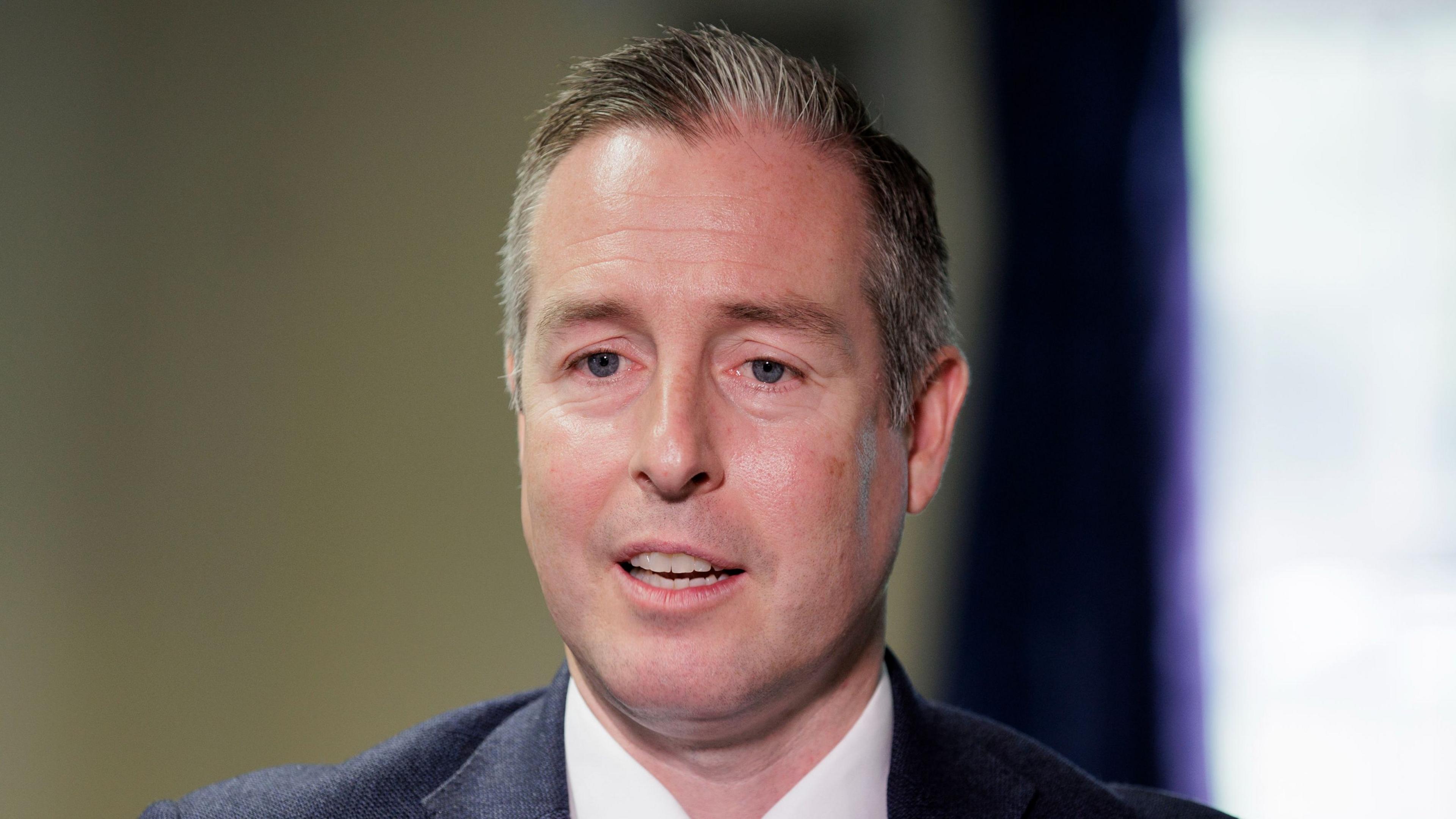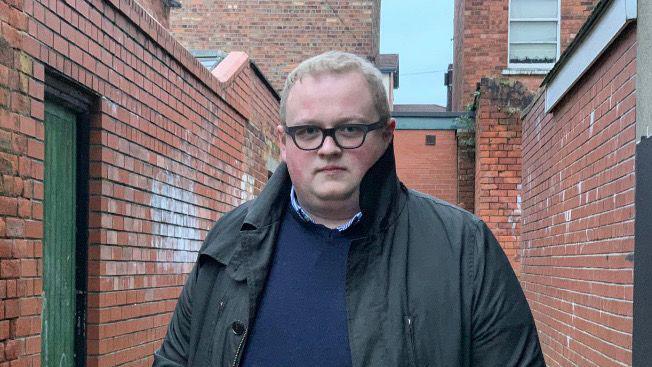Givan criticised for LCC meeting while declining 205 others

Paul Givan took up office as education minister in February 2024
- Published
Education Minister Paul Givan has declined 205 meetings with groups or organisations since he took up office.
Givan met the Loyalist Communities Council (LCC), which includes representatives from paramilitary groups the Ulster Volunteer Force (UVF) and Ulster Defence Association (UDA), on 24 September.
But he has faced criticism for meeting them ahead of other organisations.
Givan has previously defended his decision to meet with the LCC.
In a freedom of information (FoI) request the SDLP councillor Séamas de Faoite asked the Department of Education (DE): "How many groups, individuals or organisations have requested but then been refused a meeting with the minister?"
In response, the department said Givan had declined "205 meetings to date".
No details of which organisations had been unable to get meetings with the minister were revealed in the response.
But Northern Ireland's independent autism reviewer Ema Cubitt had previously told BBC News NI she had been seeking a meeting with the minister since the start of term in September.
Givan took up office as education minister in February 2024.
In his FoI request, de Faoite had also asked about what was discussed about a plan for an integrated Irish-medium school in east Belfast at the meeting with the LCC.
According to a note of the meeting published by DE, Scoil na Seolta was "causing polarity and volatility in the community", according to the LCC chair David Campbell.
In their FoI response to de Faoite, the department said that the LCC had "raised the issue of Scoil na Seolta".
But the response also said that the minister had not made any commitment to the LCC in relation to Scoil na Seolta.
It also said that the LCC had requested the meeting with Givan.

SDLP councillor Séamas de Faoite submitted a Freedom of Information request to the department
The department also said that neither the minister nor his special advisor had sought or received "any guidance from the department's permanent secretary or the department's legal advisors in advance of the meeting with the LCC".
"Like many people, I was quite concerned that the minister had met with the LCC, particularly as we had a lot of feedback from other groups and organisations who had sought to meet with the minister and had been turned down", de Faoite told BBC News NI.
He said he had been contacted by a number of different groups.
De Faoite said that included organisations who wanted to meet the minister about "special educational needs (SEN) provision, the reform of relationship and sexuality education (RSE), the provision of free school meals and support for children and families that are struggling through the cost of living crisis".
"Groups that have all tried and sought to meet the minister and have been refused."
De Faoite's SDLP colleague Matthew O'Toole also questioned the minister in the assembly on Monday.
In response, Givan said that he had accepted 324 invitations to meet from "schools, individuals and many organisations" since taking up office.
The minister said he had "fulfilled hundreds of these, including visits to many schools and community facilities that represent every part of our society".
"Given the significant demands on my diary, it would not be possible to accommodate every request," he continued.
"I will not make any apology for making sure that we seek to move every part of our society forward."
'Hypocritical'
Givan also mentioned the late SDLP leader John Hume in response to O'Toole.
"When John Hume embraced Gerry Adams and Sinn Féin, when the IRA were up to their neck in murdering people of our country, John Hume's response was: 'I don't give two balls of roasted snow what you think'," he said.
"I, however, do have concern and I share those concerns but I'll continue to work in every community to bring them forward."
The Alliance MLA Nick Mathison also asked the minister his rationale for meeting the LCC over education policy.
"I've often said that because you have a past doesn't mean that you shouldn't have a future," Givan responded.
He spoke of his own family members who had served in the prison service.
"Some of the very people you're being critical or some are being critical that I met with, my family locked up day after day in the Maze prison," he continued.
"My uncle took 13 bullets as he drove down the motorway, my father served in both loyalist and republican wings."
"The Alliance Party and others here campaigned vociferously to get them all released."
"I campaigned against The Belfast Agreement but now having the Alliance Party and others champion the early release of mass murderers into our society, they criticise and have the cheek to criticise me for wanting to move our society forward."
"I'll not be lectured by those who are acting in a very hypocritical fashion on this issue," he added.
The LCC also recently met Democratic Unionist Party (DUP) Minister for Communities Gordon Lyons.
Focus on those who have moved away from their past
Speaking on BBC Radio Ulster's Good Morning Ulster Programme, DUP MLA Edwin Poots said "people need to move away from the past".
He added that in his South Belfast constituency many people who had been involved in paramilitary organisations in the course of The Troubles, in both republican and loyalist sides, have "largely stepped back from everything that’s involved with" and that they still "have a friendship".
He said there are many people across Northern Ireland who have "simply retired from all of that... who are not involved in any of those activities that you would associate with a paramilitary organisation."
"We would do well to focus on where people have actually done good things... and have moved entirely away from the past."
What is the Loyalist Communities Council?
The LCC was set up in 2015 by former Downing Street Chief of Staff Jonathan Powell as an umbrella group representing proscribed loyalist organisations linked to terrorism - the Ulster Defence Association (UDA), the Ulster Volunteer Force (UVF) and the Red Hand Commando.
It was launched back then to coincide with the 21st anniversary of the 1994 Combined Loyalist Military Command ceasefire.